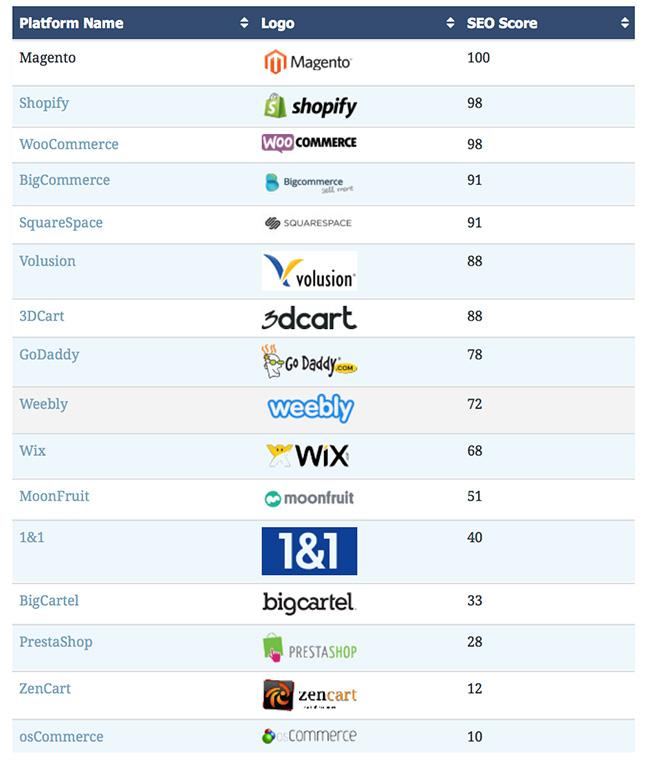ul. Strzegomska 2-4
53-611 Wrocław
NIP 8992786490
KRS 0000608120
REGON 363987723
Global4Net Sp. z o. o.
+48 71 358 41 00
© 2009 – Global4Net. All Rights Reserved.

One of the key elements taken into account when choosing an e-commerce platform is its impact on positioning. How does Magento fall out from this angle? Is it profitable to pay for the implementation of 2-3 times the price of another e-commerce platform? In response to these questions, I hope to help the following article. It is worth mentioning that 44% of transactions in global e-commerce in 2012 originated in the organic traffic.
For the following comparison, I will use the statement prepared by Danny Richman, a consultant who worked for the BBC and the Bank of England, among others. He took into consideration the most popular platforms currently on the global e-commerce market. The adopted methodology was based on a summary of key SEO factors in 2013 available online at http://moz.com/search-ranking-factors. Each factor was assigned a weight based on its correlation with the growth in the Google ranking examined by MOZ. The result of the analysis was the ranking of the most valuable platforms in terms of SEO, its result can be seen below.

As can be seen from the above statement, Magento competes on the head in terms of SEO solutions. Interestingly, it was also often considered when implementing the Polish market. Presta Shop managed to get only 28 points, compared to 100 obtained by Magento. However, let’s take a closer look at what basis Dany has evaluated the platforms quoted.
Weight 10/10
Page titles appear in the bookmark names in the browser as well as links in the search results. There is a strong correlation between the content of keywords in page titles and search results, especially when keywords appear first. Some platforms have the ability to automatically generate page titles based on product names or category names. Two platforms included in the combination (3DCart and BigCartel) do not offer this functionality at all, while the three require additional modifications to achieve it.
Weight 9/10
It is a link shown in the browser bar that identifies a given article, product or category. There is a large correlation between the search results and the keywords contained in the URL. Some platforms automatically generate friendly links for products and categories, based on their name. Nevertheless, it is important to also have independent control over these elements. Two of the platforms (Wix !$#amp#$! BigCartel) do not offer this functionality at all, but four only after the implementation of additional solutions.
Weight 9/10
Meta descriptions appear in the browser under links in the search results. Although the descriptions themselves do not have such a big impact on the position of the page in the search engine, properly prepared, they can significantly increase the click-through rate of the website relative to the competition. Some e-commerce platforms automatically generate meta descriptions without giving any control over their content. Two of the platforms in the set (ZenCart and BigCartel) do not offer this functionality at all, while OsCommerce requires additional extensions for it.
Weight 3/10
The aliases added to the images are used to describe the content of images for search engines that are not able to recognize the contents of the images in a normal way. While fats are not very important for search results, they already have a significant impact in the case of searches with the option to find graphics. It is therefore important that the tags for photos be added automatically. Three of the platforms do not offer this functionality at all (GoDaddy, BigCartel and PrestaShop), while ZenCart and OsCommerce enable it to be achieved after making some modifications.
Write to us




